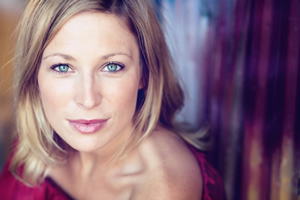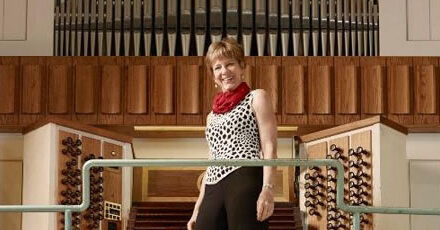It was fun… not the usual primary emotion resulting from a major concert of German music led by an orchestra’s Principal Conductor. But when Keith Lockhart led the Brevard Music Center Orchestra in Carl Orff’s Carmina Burana, preceded by Richard Strauss’ “Burleske,” for piano and orchestra, the performers produced a consistent emotional tone of playfulness as well as musical quality. It was sophisticated fun, to be sure, but primarily it was just plain fun.
Bruce Murray joined the orchestra for Strauss’ only venture into a work for piano and orchestra. Written as a Scherzo when Strauss was 22, the piano part was deemed too difficult to play after a run-through with Hans von Bülow’s orchestra. “Burleske” was premiered four years later after a few revisions and a renaming to indicate its tongue-in-cheek character. The work begins and ends humorously with solo timpani passages: at several points the timpani plays ping pong with the pianist; and there are musical quotes from both Brahms and Wagner (an inside joke since Strauss was one of the few in 1890 who did not take sides in the epic Brahms vs. Wagner wars).
But along with the humor, there are great passages that presage later work by the composer. A slow 3/4 passage reminds one of a bittersweet Rosenkavalier Waltz. Another passage has the irreverence of Till Eulenspiegel deciding what mischief to do next. Shortly before the final timpani passage, the pianist skips along with the orchestra as ironically pleased as the hero of Ein Heldenlieben. Murray and the orchestra brought out the brilliance as well as the humor of the composition.
During intermission, the Brevard Music Center Chorus moved onstage, where they stood behind the orchestra. Prepared by chorus master Keith Jones, the chorus consisted of about 35 voice students and 60 students of piano and composition, leavened by a dozen choral singers from the outside community. Soloists were noted lyric tenor Stanford Olsen and BMC students Lara Ciekewicz, soprano, and Ted Federle, a lyric baritone with great control of his falsetto range.
Carl Orff’s secular cantata Carmina Burana is a festive piece celebrating a range of human emotion including the joys of drinking and the erotic attraction of young lovers for each other, but always under the sway of Dame Fortune. The famous “O Fortuna” begins and ends the piece, and the precision and conviction of the choral entry that opened this performance told us immediately that this was going to be good.
The chorus throughout showed the virtue of intelligent musicians. There was nothing to complain about in terms of the ensemble’s tonal quality, but the excellence came from superb intonation, accurate attacks, and an understanding of the complex rhythms that give this piece its immediacy. The drinking song “In taberna quando sumus” (which demands the pace and diction of a Gilbert & Sullivan patter song but is in ecclesiastical Latin) was executed with panache.
The soloists were appropriately theatrical. Olsen’s solo “The Roast Swan” included facial expressions, gestures, and a spreading of his jacket to bemoan that he is being roasted on a spit and cannot fly anymore. As the two young people became increasingly aroused, they faced each other from their microphones and sent “come hither” looks across the podium. Ciekewicz fluttered eyelashes, raised eyebrows, and moved knees suggestively beneath her gown. Federle thrust his body and adopted an expectant pose as the music, along with the emotional level, experienced an accelerando.
The orchestra and chorus melded seamlessly into a convincing whole. There was only one item out of balance. While the microphone used by the tenor and soprano was appropriately amplified, the microphone used by the baritone was over-amplified for his first three solos, causing his voice to obtrude over the ensemble. The balance seemed to have been corrected for the final duet.
The Brevard Music Center has instituted higher ticket prices for concerts led by Lockhart this season, and Sunday’s near-capacity audience demonstrated that this policy has not deterred attendance. Enthusiastic concertgoers appreciate the superb results elicited by this fine conductor from the increasingly national and international student body at the Brevard Music Center.












